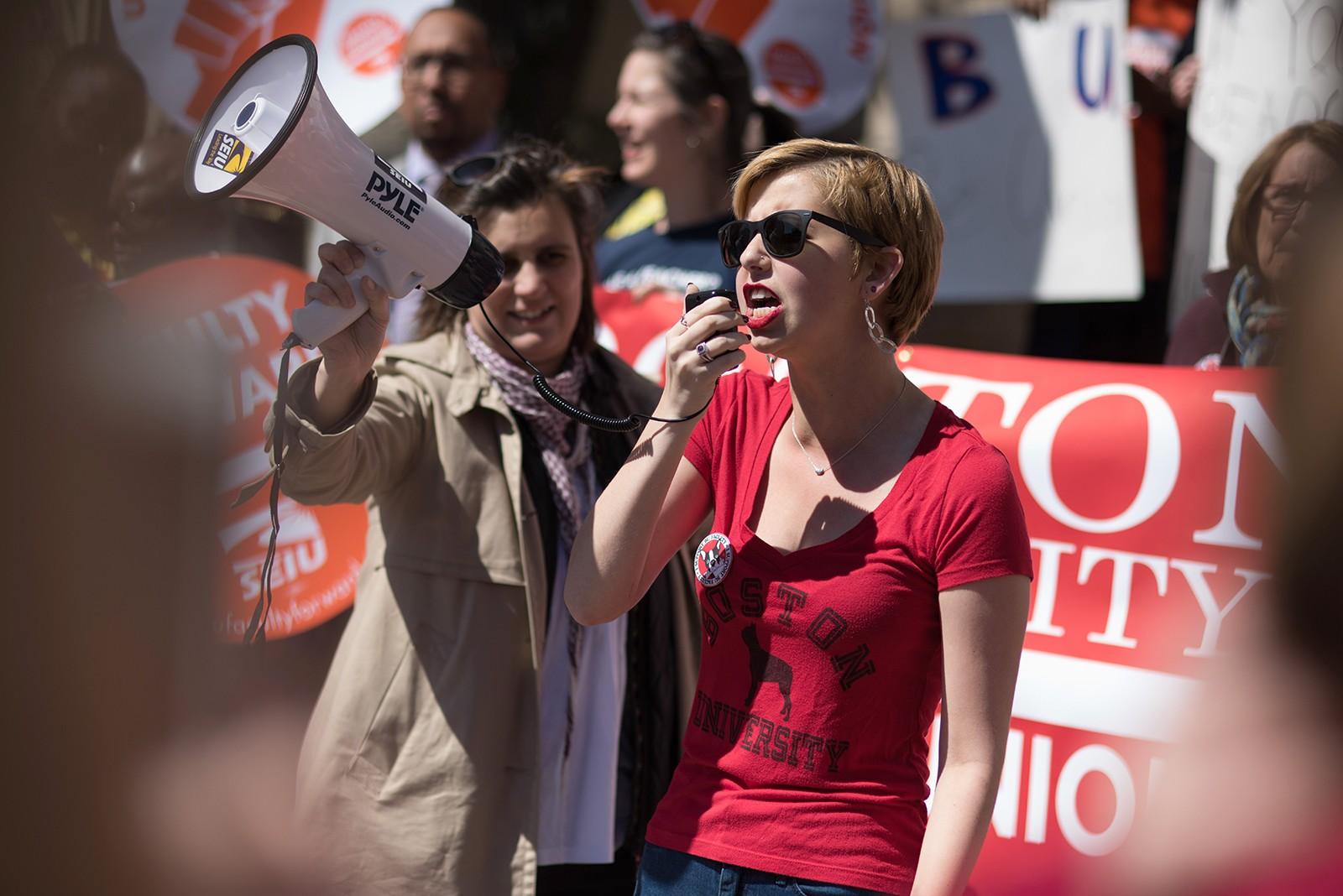[mediagrid cat=”30474″]
Boston University adjunct faculty members lead a rally approximately 100 strong Thursday to improve learning conditions at BU and raise awareness of the unfair treatment they claim they experience at the university.
Joined by Boston-area college students and faculty, healthcare workers, fast food workers and members of Service Employees International Union Local 509, the protesters marched to BU President Robert Brown’s office, hoping to deliver a letter to him.
“Hey BU, you can’t hide, we can see your greedy side,” the protesters chanted as they walked down Commonwealth Avenue and passed out flyers to student and spectators.
The protesters arrived at 1 Silber Way and requested to deliver their letter, signed by community members who support adjunct’s rights, directly to Brown’s office. Brown’s Chief of Staff Douglas Sears received the letter in front of the building.
Protesters then headed back to Commonwealth Avenue and stood across the road, blocking traffic on both sides of the street and the Massachusetts Bay Transportation Authority tracks. Numerous vehicles, as well as an outbound train, were forced to stop in front of the protesters. Blocked by the crowd, the drivers honked and signaled for the protesters to clear the street.
Protesters stood along the road for 10 minutes, then kept marching to the Massachusetts State House, where they joined other advocates for the #WageAction movement.
BU adjunct professors voted Feb. 4, 2015 to join SEIU Local 509, and they have been trying to negotiate a contract with the university for more than a year, The Daily Free Press reported Feb. 26, 2016.
Janet Bailey, a part-time lecturer in the Metropolitan College, said she has been an adjunct professor for 17 years, yet she still worries about her job security because the university only signs short-term contracts. The rally was a response to the BU administration’s reluctance to meet part-time faculty’s demands for increased equality, Bailey added.
“BU has been dragging their feet in actually coming to contact terms with us,” Bailey said. “It’s very frustrating, and we are out here trying to bring attention to that fact. Hopefully we get their attention and get them to start moving.”
Laurie LaPorte, an adjunct anthropology professor, said she and her fellow 800 adjunct faculty members at BU deserve the same workplace benefits as full-time faculty, namely better pay and long-term contracts.
“President Brown will announce at a Board of Trustees dinner tonight that the university raised $1 billion,” LaPorte said during the protest. “Where did the money go? [The adjuncts] did not see any.”
Full- and part-time faculty are the same in terms of teaching performance, LaPorte said. The difference, she said, lies in their treatments, which will ultimately compromise students’ learning experiences.
“BU wants to have low-wage faculty here,” LaPorte said. “It’s not fair, and it’s not right. Students are increasingly getting involved [in defending the adjuncts] because they do not want to earn their education on the backs of low-paid, undervalued, disrespected and disposable faculty.”
Several students who participated in the protest said they were sympathetic to the BU adjuncts’ working conditions and hoped to push the administration for more thoughtful policies.
Gregory Kerr, a member of the Student Curriculum Committee, said adjunct professors should be treated in accordance with the value they bring to their classrooms.
“Adjunct professors are an amazing resource to BU students,” Kerr, a sophomore in the College of Arts and Sciences, said. “But BU is treating them absolutely terribly with semesterly contracts, no job security, terrible wages, bad conditions in classrooms and office spaces. It not only affects the adjunct professors, but also affects the students adversely.”
Abigail Kass, a sophomore in CAS and an SCC member, said the rally’s strength in numbers was the perfect representation of the BU community’s solitary for the adjuncts.
“Everyone here showing support just shows that BU needs to get its act together,” Kass said. “By obstructing the traffic, it shows we are not willing to wait for the fair contracts for the adjuncts. We are prepared to shut down traffic to show how much we care.”
Ike Hammond, a freshman in the Questrom School of Business, said a larger proportion of the BU community should be behind this movement, and should work for real change from administration.
“It’s hard to get through to President Brown,” Hammond said. “His office is like an ivory tower. The rate [adjuncts] are getting paid doesn’t add up to much — it’s barely a fair living wage. For the same reason people want to raise the minimum wage, you should want to pay the adjuncts fairly, it’s the same principle.”
Kati Bohmbach, a sophomore in the College of Communication, said students should be more concerned with the challenges part-time faculty face.
“What if these were your parents just trying to provide for you? That’s how I see it,” she said. “A lot of people are here because they care about the name ‘BU’ and where that can take them in the future, but I think they should care about the professors that come here every day for them.”



















































































































